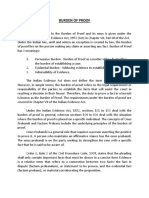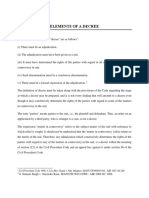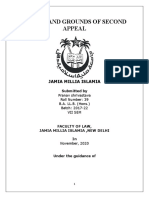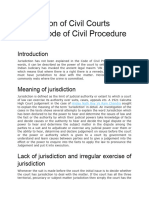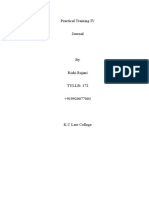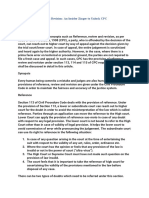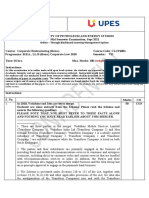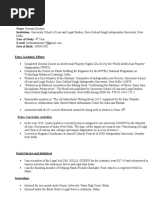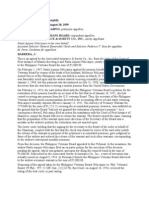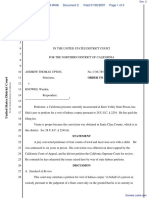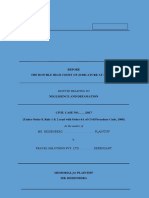0 ratings0% found this document useful (0 votes)
118 viewsDECREE
DECREE
Uploaded by
amritam yadavThe document defines and discusses the term "decree" according to Section 2(2) of the Code of Civil Procedure, 1908.
A decree is the formal expression of an adjudication by a civil court that conclusively determines the rights of the parties regarding matters in controversy in a suit. It can be preliminary, final, or partly preliminary and partly final. For an adjudication to be considered a decree, it must determine the substantive rights of parties to relief on matters in dispute. Orders that are appealable or dismiss a case for default do not qualify as decrees. The document provides examples and explanations to differentiate decrees from other civil court orders and decisions.
Copyright:
© All Rights Reserved
Available Formats
Download as PPTX, PDF, TXT or read online from Scribd
DECREE
DECREE
Uploaded by
amritam yadav0 ratings0% found this document useful (0 votes)
118 views12 pagesThe document defines and discusses the term "decree" according to Section 2(2) of the Code of Civil Procedure, 1908.
A decree is the formal expression of an adjudication by a civil court that conclusively determines the rights of the parties regarding matters in controversy in a suit. It can be preliminary, final, or partly preliminary and partly final. For an adjudication to be considered a decree, it must determine the substantive rights of parties to relief on matters in dispute. Orders that are appealable or dismiss a case for default do not qualify as decrees. The document provides examples and explanations to differentiate decrees from other civil court orders and decisions.
Copyright
© © All Rights Reserved
Available Formats
PPTX, PDF, TXT or read online from Scribd
Share this document
Did you find this document useful?
Is this content inappropriate?
The document defines and discusses the term "decree" according to Section 2(2) of the Code of Civil Procedure, 1908.
A decree is the formal expression of an adjudication by a civil court that conclusively determines the rights of the parties regarding matters in controversy in a suit. It can be preliminary, final, or partly preliminary and partly final. For an adjudication to be considered a decree, it must determine the substantive rights of parties to relief on matters in dispute. Orders that are appealable or dismiss a case for default do not qualify as decrees. The document provides examples and explanations to differentiate decrees from other civil court orders and decisions.
Copyright:
© All Rights Reserved
Available Formats
Download as PPTX, PDF, TXT or read online from Scribd
Download as pptx, pdf, or txt
0 ratings0% found this document useful (0 votes)
118 views12 pagesDECREE
DECREE
Uploaded by
amritam yadavThe document defines and discusses the term "decree" according to Section 2(2) of the Code of Civil Procedure, 1908.
A decree is the formal expression of an adjudication by a civil court that conclusively determines the rights of the parties regarding matters in controversy in a suit. It can be preliminary, final, or partly preliminary and partly final. For an adjudication to be considered a decree, it must determine the substantive rights of parties to relief on matters in dispute. Orders that are appealable or dismiss a case for default do not qualify as decrees. The document provides examples and explanations to differentiate decrees from other civil court orders and decisions.
Copyright:
© All Rights Reserved
Available Formats
Download as PPTX, PDF, TXT or read online from Scribd
Download as pptx, pdf, or txt
You are on page 1of 12
DECREE
Definition (Section 2(2) of CPC, 1908)
• “Decree” means the formal expression of an adjudication which, so far as
regards the Court expressing it, conclusively determines the rights of the parties
with regard to all or any of the matters in controversy in the suit and may be
either preliminary or final. It shall be deemed to include the rejection of a plaint
and the determination of any question within section 144, but shall not include
—
• (a) any adjudication from which an appeal lies as an appeal from an order, or
• (b) any order of dismissal for default.
Explanation.—A decree is preliminary when further proceedings have to be taken
before the suit can be completely disposed of. It is final when such adjudication
completely disposes of the suit.It may be partly preliminary and partly final;
Decree means According to section 2(2) "Decree" means the formal expression of an
adjudication which conclusively determines the rights of the parties with regard to all or any of
the matters in controversy in the suit.
• (i) there must be an adjudication of a suit with formal expression;
Adjudication – Judicial determination of the matter in dispute
• (ii) the adjudication must determine the rights of parties regarding the matter in controversy;
• (iii) such determination must be conclusive in nature.
• (iv) such adjudication must be given by a civil court.
• (v) such decision must have been expressed in a suit.
Hansraj Gupta v. Official liquidators of the Dehradun-Mussoorie Electric Tramway Co. Ltd.
(AIR 1933 PC 63)- The word “suit” ordinarily means, a civil proceeding instituted by the
presentation of a plaint.
NOTE- In Certain enactments specific provisions have been made to treat applications as suits,
like proceedings under Indian Succession Act, Hindu Marriage Act etc.
If all the above conditions are fulfilled, the decision is a decree, if not; it is an order or a finding
on an issue.
Formal expression of Adjudication
Formal expression implies acceptance or rejection of any or all the
reliefs claimed in the plaint and embodied in a formal declaration.
Madan Naik Vs. Hansubala Devi, AIR 1983 (SC) 676
“ An adjudication means a judicial determination of a matter in
controversy. If there is no judicial determination of any matter in
dispute, it is not a decree. Further such judicial determination must be
by a court. Thus an order passed by an officer who is not a court is not
a decree. “
Rights of parties as to matter in controversy :
The word “rights” means substantive rights of the parties and not merely
procedural rights.
The words “rights of the parties’ in the definition of the decree have
reference to ‘rights to relief.”
So every order of the trial court which grants or refuses a relief is a
decree.
There must have been adjudication on the rights of the parties. Thus an
order of dismissal for default of appearance is no determination of the
rights of the parties, and therefore is not a decree.
Conclusively determine
• The expression implies that the decision must be one which is
complete and final at regards the court which passed it.
• An interlocutory order which does not decide the rights of the parties
finally is not a decree.
• Shankar v. Chandrakant (AIR 1995 SC 1211)- “it was held that a decree
becomes final in two ways:-
a) When the time to file appeal has expired without filing appeal or
the matter is decided by the decree of a highest court; and
b) Where decree so far as regards the court passing it completely
disposes of the suit.
According to section 2(2) decree shall also include:
i) the rejection of a plaint; and
ii) the determination of any question within section 144.
According to section 2(2) decree shall not include:
(i) any appealable order; or
(ii) any order for dismissal for default
Types of Decrees
• According to the definition provided under section 2(2) of the CPC, 1908, a
decree may be either Preliminary or
• Preliminary or Final or Partly preliminary and partly final;
• Deemed Decree
Preliminary Decree: A decree is preliminary when further proceedings have to
be taken before the suit can be completely disposed of.
In Shankar vs Chandrakant SCC 1995, SC stated that a preliminary decree is one
which declares the rights and liabilities of the parties leaving the actual result
to be worked out in further proceedings.
Example:- suit for mesne profits, dissolution of partnership, suits relating to
partition.
Final Decree A final decree is one which completely disposes of a suit and finally settles all
questions in controversy between parties and nothing remains to be decided thereafter.
• A decree may be said to be final in three ways:
a) when no appeal is filed within the prescribed period; or
b) the matter has been decided by the decree of the highest court and
c) when the decree, so far as regards the court passing it, completely disposes of the suit.
Partly preliminary and partly final : A decree inheriting characteristics of partly preliminary and
partly final is passed in suits as for possession of land and mesne profits, the court orders to deliver
possession of the land in favour of the plaintiff and directs inquiry regarding the mesne profits. The
first portion of the decree is final as it directs the delivery of possession to the plaintiff, while the
second portion is preliminary in as much as it directs an inquiry as to mesne profits.
Contents of decree: According to R. 6(1) Or. 20 of the CPC, 1908 decree shall contain the following
things:
• The number of the suit,
• The names and descriptions of the parties,
• Particulars of the claim, and
• Shall specify clearly the relief granted or other determination of the suit.
Points to remember
• Concept of Consent Decree and Ex-parte Decree.
• Relevance of section 96(3) of Civil Procedure Code, 1908
• Section 97 of Civil Procedure Code, 1908- Appeal from final decree
where no appeal from preliminary decree.—Where any party
aggrieved by a preliminary decree passed after the commencement of
this Code does not appeal from such decree, he shall be precluded
from disputing its correctness in any appeal which may be preferred
from the final decree.
Examples of Decree
• Rejection of Plaint
• Rejection of Memorandum of Appeal
• An order setting aside ex-parte decree.
• Dismissal of suit or appeal for want of evidence or proof.
• Order refusing one of several reliefs.
Decisions which are not decree
• An order rejecting an application for Suit by an indigent person
• An order rejecting stay.
• Dismissal of appeal for default.
• Return of plaint for presentation in proper court.
• Rejection of application for condonation of delay.
Examples of Preliminary Decree
• Suits for possession and mesne profits. (Order 20 Rule 12)
• Suits for dissolution of partnership firms. (Order 20 Rule 15)
• Suits for partition and separate possession. (Order 20 Rule 18)
You might also like
- 203 Bsa ProjectDocument20 pages203 Bsa Projectmiss.sharvisharmaNo ratings yet
- Essential Soft Skills for Lawyers: What They Are and How to Develop ThemFrom EverandEssential Soft Skills for Lawyers: What They Are and How to Develop ThemNo ratings yet
- Burden of ProofDocument4 pagesBurden of Proofumesh kumarNo ratings yet
- Actions in Rem, in Personam, and Quasi in RemDocument1 pageActions in Rem, in Personam, and Quasi in RemMAC100% (4)
- Elements of A Decree 2 (2) of CPCDocument6 pagesElements of A Decree 2 (2) of CPCNidhi GuptaNo ratings yet
- Q. 1 Explain Decree and Its Types, Execution, Modes.: CPC AnswersDocument117 pagesQ. 1 Explain Decree and Its Types, Execution, Modes.: CPC AnswersAisha SonkarNo ratings yet
- Decree and OrderDocument15 pagesDecree and OrderSajjan SharmaNo ratings yet
- Summon Under CPCDocument2 pagesSummon Under CPCAishwaryaNo ratings yet
- One Liner Case LawDocument4 pagesOne Liner Case LawGautamNo ratings yet
- Lecture 3 - Evidence and Kinds of EvidenceDocument14 pagesLecture 3 - Evidence and Kinds of Evidencestevin.john538No ratings yet
- DecreeDocument9 pagesDecreeParjanya ShekharNo ratings yet
- Indian Evidence ActDocument24 pagesIndian Evidence ActLavina PunjabiNo ratings yet
- Nature and Grounds of Second Appeal: Jamia Millia IslamiaDocument28 pagesNature and Grounds of Second Appeal: Jamia Millia IslamiaPranavNo ratings yet
- Suits in Special CasesDocument52 pagesSuits in Special CasesAsdfghNo ratings yet
- Law of Remand Us 167 CRPCDocument21 pagesLaw of Remand Us 167 CRPCfaiz alqmNo ratings yet
- Appearance and Non Appearance of Parties in CPCDocument11 pagesAppearance and Non Appearance of Parties in CPCved prakash rao100% (1)
- Kinds of EvidenceDocument4 pagesKinds of EvidenceAmina AamerNo ratings yet
- Jurisdiction of Civil Courts Under Code of Civil ProcedureDocument12 pagesJurisdiction of Civil Courts Under Code of Civil ProcedureshwetaskasbeNo ratings yet
- In The Supreme Court of IndiaDocument13 pagesIn The Supreme Court of IndiaMahima ChauhanNo ratings yet
- Code of Civil Procedure and Law of LimitationDocument23 pagesCode of Civil Procedure and Law of LimitationKaranSinghNo ratings yet
- Art 21-1Document9 pagesArt 21-1AnonymousNo ratings yet
- Appeals From Original DecreeDocument11 pagesAppeals From Original DecreeChinmoy Mishra100% (1)
- Sufficient CauseDocument6 pagesSufficient CauseNarayan SubramanianNo ratings yet
- Decree and OrderDocument12 pagesDecree and Orderajay jainNo ratings yet
- SC ST Act CasesDocument7 pagesSC ST Act CasesHarsh PatidarNo ratings yet
- Code of Civil Procedure: University Institute of Legal Studies, Panjab University (Chandigarh)Document22 pagesCode of Civil Procedure: University Institute of Legal Studies, Panjab University (Chandigarh)sssNo ratings yet
- CPC 2Document24 pagesCPC 2Amshula Prakash100% (1)
- Zahira Habibullah Sheikh &anr V State of Gujrat & OrsDocument9 pagesZahira Habibullah Sheikh &anr V State of Gujrat & OrsIshita AgarwalNo ratings yet
- 1871 and Second in Indian Penal Code Under Section 40 Which States That Offense" Denotes ADocument22 pages1871 and Second in Indian Penal Code Under Section 40 Which States That Offense" Denotes ASuriya AadilaNo ratings yet
- CRPC DifferencesShortNotesDocument6 pagesCRPC DifferencesShortNotesamitrupaniNo ratings yet
- Section 125 CRPC PDFDocument5 pagesSection 125 CRPC PDFSaurabh YadavNo ratings yet
- CitationsDocument21 pagesCitationsVaibhav Chaurasia0% (1)
- Code of Criminal ProcedureDocument6 pagesCode of Criminal ProcedurebernardNo ratings yet
- Receiver (Order 40) - CPC PresentationDocument14 pagesReceiver (Order 40) - CPC PresentationSwetha TNo ratings yet
- Civil Procedure Code Ta5aDocument2 pagesCivil Procedure Code Ta5aSubramaniamNo ratings yet
- Justice Delivery System in IndiaDocument44 pagesJustice Delivery System in IndiaAmit SharmaNo ratings yet
- Decree CPC TutorialDocument9 pagesDecree CPC TutorialKing Raz100% (1)
- CPCDocument15 pagesCPCNilesh Kumar BaghelNo ratings yet
- The Code of Civil Procedure 1908 LectureDocument5 pagesThe Code of Civil Procedure 1908 LectureJack DowsonNo ratings yet
- Legal Incidents of PlaintDocument31 pagesLegal Incidents of PlaintApoorvNo ratings yet
- Hidayatullah National Law University, Raipur Trial Before A Court of SessionsDocument24 pagesHidayatullah National Law University, Raipur Trial Before A Court of SessionsApoorvaChandraNo ratings yet
- Cr. P CDocument59 pagesCr. P CSonali SinghNo ratings yet
- CPC NotesDocument170 pagesCPC Notesstevin.john538No ratings yet
- Stages of Civil Suits From Plaint To DecreeDocument4 pagesStages of Civil Suits From Plaint To DecreeUmakanta ballNo ratings yet
- Indian Evidence Act Notes - Till Sec 55Document57 pagesIndian Evidence Act Notes - Till Sec 55osthatiosNo ratings yet
- 2-Evidentiary Value of A Dying DeclarationDocument7 pages2-Evidentiary Value of A Dying DeclarationVISHALNo ratings yet
- Last Seen TogetherDocument9 pagesLast Seen TogetherKumar NaveenNo ratings yet
- Disposal of The Suit at The First Hearing Under CPCDocument4 pagesDisposal of The Suit at The First Hearing Under CPCjatinsharma.ms30039No ratings yet
- CPCDocument20 pagesCPCAnurag ChaudhariNo ratings yet
- 2-Markers With Answers: Civil Procedure Code & Limitation ActDocument11 pages2-Markers With Answers: Civil Procedure Code & Limitation ActVenket Vaasan RamachandranNo ratings yet
- CPC - Module 4 - (E) - Written StatementDocument22 pagesCPC - Module 4 - (E) - Written StatementVishnupriya V 19BLB1033No ratings yet
- KK Sinha Appellant - 20210326Document24 pagesKK Sinha Appellant - 20210326rishi rajaniNo ratings yet
- TortDocument31 pagesTortRavi Prakash MNo ratings yet
- Diff Between Primary Anf Final DecreeDocument5 pagesDiff Between Primary Anf Final Decreeshweta khannaNo ratings yet
- Rule Against PerpetuityDocument8 pagesRule Against PerpetuityBharti Kumari100% (1)
- Property Law ProjectDocument15 pagesProperty Law ProjectAfreenNo ratings yet
- Evidence Act IntroductionDocument37 pagesEvidence Act IntroductionProject SubmitNo ratings yet
- Transfer Petition CPC Sec 25 DekheDocument12 pagesTransfer Petition CPC Sec 25 DekheFaizu 2No ratings yet
- Admissions, Confessions, Statements and Dying DeclarationsDocument24 pagesAdmissions, Confessions, Statements and Dying DeclarationsosthatiosNo ratings yet
- Reference CPCDocument11 pagesReference CPCPalak SachdevaNo ratings yet
- Relevancy and AdmissibilityDocument7 pagesRelevancy and Admissibilityamritam yadav100% (1)
- Difference Between IRDA and SEBI On Their FunctionsDocument1 pageDifference Between IRDA and SEBI On Their Functionsamritam yadavNo ratings yet
- Logical and Legal RelevancyDocument8 pagesLogical and Legal Relevancyamritam yadav100% (1)
- IRDA, Functions, Roles, Power, Duties EtcDocument4 pagesIRDA, Functions, Roles, Power, Duties Etcamritam yadavNo ratings yet
- IRDA & MilestonesDocument2 pagesIRDA & Milestonesamritam yadavNo ratings yet
- Roll No.R760218115 SAP ID 500071424: Online - Through Blackboard Learning Management SystemDocument7 pagesRoll No.R760218115 SAP ID 500071424: Online - Through Blackboard Learning Management Systemamritam yadavNo ratings yet
- COURSE PLAN - CPC II & The Limitation Act, 1963 CLCC3010 - BBA LLB (CORP LAW)Document14 pagesCOURSE PLAN - CPC II & The Limitation Act, 1963 CLCC3010 - BBA LLB (CORP LAW)amritam yadavNo ratings yet
- Name - Amritam Shankar Topic-Management by Objectives ROLL-115 SAP ID - 500071424Document7 pagesName - Amritam Shankar Topic-Management by Objectives ROLL-115 SAP ID - 500071424amritam yadavNo ratings yet
- Roll No. Sap Id: Online - Through Blackboard Learning Management SystemDocument1 pageRoll No. Sap Id: Online - Through Blackboard Learning Management Systemamritam yadavNo ratings yet
- Corporate Restructuring (Hons.) - BBALLB (Hons.) Corporate Law 2018Document6 pagesCorporate Restructuring (Hons.) - BBALLB (Hons.) Corporate Law 2018amritam yadavNo ratings yet
- CL 1Document3 pagesCL 1amritam yadavNo ratings yet
- An Affidavit To This Effect Is Enclosed Herewith The PetitionDocument5 pagesAn Affidavit To This Effect Is Enclosed Herewith The Petitionamritam yadavNo ratings yet
- Varun Goswami: Career ObjectiveDocument2 pagesVarun Goswami: Career Objectiveamritam yadavNo ratings yet
- In The High Court Judicature at PatnaDocument11 pagesIn The High Court Judicature at Patnaamritam yadavNo ratings yet
- Address For Correspondence: Career ObjectiveDocument4 pagesAddress For Correspondence: Career Objectiveamritam yadavNo ratings yet
- CV - Hemant (3rd Year)Document3 pagesCV - Hemant (3rd Year)amritam yadavNo ratings yet
- Magdalo v. ComelecDocument14 pagesMagdalo v. ComelecJay EmNo ratings yet
- CIR Vs SiliconDocument7 pagesCIR Vs SiliconJennylyn Biltz AlbanoNo ratings yet
- Article IIIDocument25 pagesArticle IIICristy BalbonNo ratings yet
- Law of SupardariDocument11 pagesLaw of SupardariAhsan NaqviNo ratings yet
- CRPC Sem-III NakDocument6 pagesCRPC Sem-III NakNarayan KulkarniNo ratings yet
- Malabang Vs Benito Case DigestDocument1 pageMalabang Vs Benito Case DigesthoneygrishamNo ratings yet
- Full Text-Labor Review CasesDocument41 pagesFull Text-Labor Review CasesSometimes goodNo ratings yet
- Motion For Preventive Suspension Vs BOC Chief LinaDocument10 pagesMotion For Preventive Suspension Vs BOC Chief LinaPortCalls100% (1)
- Crimes Against National Security and The Law of NationsDocument27 pagesCrimes Against National Security and The Law of NationsRey RectoNo ratings yet
- Ndyowayesu v Serubiri 2024 UGHCCD 205 (19 December 2024)Document14 pagesNdyowayesu v Serubiri 2024 UGHCCD 205 (19 December 2024)ntumesharifuNo ratings yet
- Compilation of Cases Modes of Judicial Review - Mandamus To InjunctionDocument82 pagesCompilation of Cases Modes of Judicial Review - Mandamus To InjunctionannaleetodaNo ratings yet
- Cause List FileDocument262 pagesCause List Filesujit0% (1)
- Upton v. Knowles - Document No. 2Document3 pagesUpton v. Knowles - Document No. 2Justia.comNo ratings yet
- Student N B Legal Technique and LogicDocument4 pagesStudent N B Legal Technique and LogicShawn GonzalesNo ratings yet
- Chapter 1 Cases RianoDocument479 pagesChapter 1 Cases RianoAnonymous 4WA9UcnU2XNo ratings yet
- Criminal Law - Basic ConceptsDocument4 pagesCriminal Law - Basic ConceptsCaren Que Viniegra0% (1)
- Victorias Planters Association Inc., Et Al. - Petitioners-Appellees vs. Victorias Milling Corp. - Respondent AppellantDocument2 pagesVictorias Planters Association Inc., Et Al. - Petitioners-Appellees vs. Victorias Milling Corp. - Respondent AppellantSteve UyNo ratings yet
- Obama and Biden Indicted by Grand JuryDocument1 pageObama and Biden Indicted by Grand JuryKit Star100% (3)
- Wayland Nextel 2002 DecisionDocument27 pagesWayland Nextel 2002 DecisiondamaxsonNo ratings yet
- In Re Aurora ParongDocument2 pagesIn Re Aurora ParongSaji JimenoNo ratings yet
- Consti 1 (Gabriel Digests)Document75 pagesConsti 1 (Gabriel Digests)Ramon Carlo GuicoNo ratings yet
- COMPLAINT-supplement-07: Forwarded Via EmailDocument35 pagesCOMPLAINT-supplement-07: Forwarded Via EmailGerrit Hendrik Schorel-HlavkaNo ratings yet
- Glasgow Caledonian University V LIHE LIUDocument7 pagesGlasgow Caledonian University V LIHE LIULegal CheekNo ratings yet
- Penera Vs Comelec Nov 25Document2 pagesPenera Vs Comelec Nov 25Naldy John Delos SantosNo ratings yet
- Plaintiff MemorialDocument26 pagesPlaintiff MemorialDhanush Veer0% (1)
- Dy Teban Vs DyDocument10 pagesDy Teban Vs Dyhime mejNo ratings yet
- Bingham The Rule of Law and The Sovereignty of ParliamentDocument11 pagesBingham The Rule of Law and The Sovereignty of ParliamentEugenia Patricia Novoa ZubiriaNo ratings yet
- Agoura Hills DIVISION - 6. - NOISE - REGULATIONSDocument4 pagesAgoura Hills DIVISION - 6. - NOISE - REGULATIONSKyle KimNo ratings yet
- 19 ReplyDocument14 pages19 ReplyNoloContendereNo ratings yet


